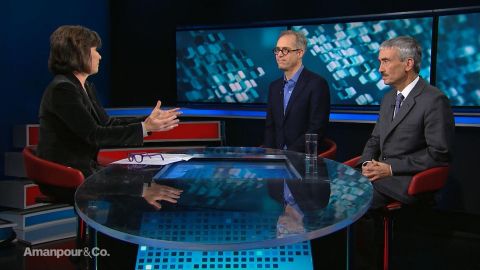Read Transcript EXPAND
CHRISTIANE AMANPOUR: As an ambassador, what do you make of the embrace now of these increasingly authoritarian leaders who are dominating the landscape?
PETER MILLETT, FORMER BRITISH AMBASSADOR TO LIBYA: Oh, the role of the military in the Middle East is fundamental to all of those countries. When you look back at the Arab Spring, when the dictator left Tunisia, the military filled the vacuum. When the dictator left Cairo, the military filled the vacuum. In Libya, the dictator fell, there was a vacuum and there was nothing to fill it. Now, we have a strongman, a military person, but his approach is very narrow-minded, it is only about military power, not about politics, not about economics. I think that’s the weakness of that approach. Unless you can tackle political issues, political and social reconciliation, have a military hierarchy and tackle economic reform and jobs for young people, then military power is not actually the long-term solution.
AMANPOUR: You’re talking about regional problems, but you’re specifically now talking about General Haftar, right?
MILLETT: Yes. I was talking specifically about him but I think there’s a more general issue there for other countries in the Middle East.
AMANPOUR: Now, I’m going to come back to him in more detail because you’ve met him and you know him and we want to know what you think his aim is.
MILLETT: Yes.
AMANPOUR: But of course, he is supported, David, by General Sisi of Egypt, president, and President Sisi is supported by President Trump and they’re very pleased with the way he’s going. From what you know about Egypt, where is that country going, and what does Trump’s embrace mean for them?
DAVID KIRKPATRICK, INTERNATIONAL CORRESPONDENT, THE NEW YORK TIMES: Well, you know, it’s interesting. There have been many times when American officials or Western officials have said a pure authoritarianism, an autocratic government with contempt for institutions is actually a recipe for instability, and that’s what Sisi has brought. That’s not what he’s getting out of this trip to the White House. What he’s trying to do now is push through changes to the Egyptian constitution that would allow him effectively to be president for life. He’s traveled all the way to Washington to get a moment with Trump where he can say to Egyptians back home, “Look, I’ve got the approval of the Americans, they’re on my side, let’s push this through and I will rule you forever.”
AMANPOUR: I think we might, in fact, have a little bit of sound of reporters asking the president about this. Let’s just play it. We don’t. But what he did say when people asked him whether he supports this president for life constitutional change is that, “I think he’s doing a very good job.” He didn’t directly answer that. But given what we’ve seen of former U.S. presidents, their policy has always been to support the leader of Egypt or elsewhere. These are their allies. What does it mean for the West if you suddenly find yourself agreeing, supporting, a president for life or the takeover by a general of what the U.N. is trying to make a civilian government in Libya? What does it mean?
MILLETT: And I think it means for the political process in a country like Libya, we have values as well as interests. And I think if our values mean that a military takeover in a country like Libya is not something we’re going to be able to accept easily nor would, I think, we see it as a successful solution to the problems of that country. We can’t afford for Libya to become a failed state. We’ve seen the problems of migration, we’ve seen the problems of terrorism which created in a country. There’s only a couple hundred miles from the borders of Europe.
AMANPOUR: Yes. We mustn’t forget all those boats that come across.
MILLETT: Yes.
AMANPOUR: Yes.
MILLETT: And I think if you have increasing lawlessness, which is likely to happen with the current military campaign, then I think the migration flows and the growth of terrorism, we will see Libya increasingly being seen as a failed state.
AMANPOUR: What do you make of the General Haftar? I mean, you’ve met mean. I mean, is he competent? Is he able to take over? Why is he even trying? Where does he get this backing from?
MILLETT: He’s a 75-year-old general. And I think he does see himself as the savior of Libya in a way that the old President Nasser of Egypt saw himself as the savior of the Arab world. I think he sees himself through that prism. And therefore, military power comes first. He will take over in Tripoli and he will solve the problems of the country.
About This Episode EXPAND
As clashes and unrest roil North Africa, former British Ambassador to Libya Peter Millett and New York Times Correspondent David Kirkpatrick discuss the turmoil in the region. Former U.S. coordinator for security and counterterrorism Richard Clarke discusses America’s safety. Hari talks the impact of climate change on our mountains and glaciers, with David Breashears, a veteran mountaineer.
LEARN MORE


